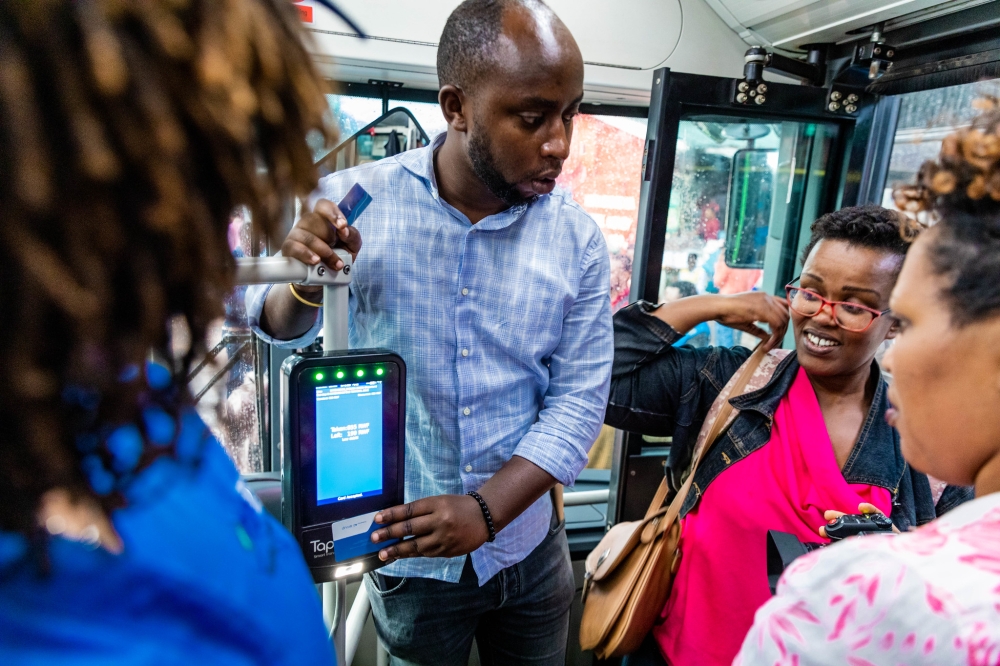

Commuters in Kigali will fully transition to a distance-based fare system by the end of December, according to Rwanda Utilities Regulatory Authority (RURA).
Under this system, which has been rolled out to 28 routes, passengers will pay fares based on the distance traveled, a development which has been welcomed by those who can now pay less on public transport.
ALSO READ: Commuters all smiles as Kigali launches distance-based fare system
The pay-per-distance initiative, which aims to balance benefits between transport service providers and commuters, entered its second piloting phase on December 16, after it was launched in 24 more routes, from two in earlier in the month.
The system will have been deployed to all 60 routes in Kigali by early 2025, according to officials at RURA.
A passenger taps in on the meter when boarding the bus and the system deducts the fare of the entire route. When the passenger gets of the bus before the last stop, he or she taps out on meter to be able get the unused fare. For example, the trip from Downtown to Kabuga is Rwf787. If the passenger gets off the bus at ‘Kuri 15’, he or she saves Rwf206.


In the first days of the new payment system, passengers and drivers pointed to issues related to getting change after getting of the bus. But these issues have been addressed and the operations are smoother, according to passengers who spoke to The New Times.
ALSO READ: With new payment system, commuters in Kigali may spend less on public transport
"I have not encountered any issues so far. Even for those traveling the entire route, the fare increase is negligible. This system is very advantageous, and we’re excited to use it,” Rachel Uzamukunda, who regularly commutes from Downtown-Kabuga route, said.
Olivier Nzamurambaho, a supervisor representing the City of Kigali on one of the newly piloted routes, echoed similar sentiments.
"Initially, there were report of issues in the system, but we’ve since addressed them. Drivers report no passenger complaints, and the system is proving beneficial. For instance, commuters can now use multiple buses for their journey and get refunds for unused distances, making the system both flexible and economical,” Nzamurambaho said.
ALSO READ: Five ways bus lanes will improve Kigali public transport
The pilot phase is crucial to ensuring all potential challenges are addressed before the system’s citywide launch, according to Beata Mukangabo, RURA’s Head of Transport
"Each vehicle and route is unique. For instance, a mapped bus stop might be overlooked and requires adjustments to the sytem. Testing every route ensures the system operates seamlessly when fully implemented,” Mukangabo explained.
She assured close collaboration with transport service providers, who are optimistic about the system’s potential to attract more passengers.
"We’ve worked together since the system’s inception, sharing data and insights. Service providers welcome the change, recognizing its ability to encourage more people to use public transport,” she said.
Under the new system, fares have been adjusted to reflect current market conditions. For instance, the fare for a full trip from Downtown to Kimironko has increased from Rwf355 to Rwf426, with shorter distances priced as low as Rwf180 per kilometer. This approach aligns with agreements made between stakeholders to ensure sustainable and fair pricing, according to Mukangabo.
"This pilot phase allows us to address emerging issues,” said Charles Ngarambe, chief executive of Kigali Bus Services (KBS), one of the bus companies operating in the capital. "By creating a system that benefits both operators and commuters, we aim to enhance Kigali’s public transport experience. Sustainable operations for service providers ensure consistent and reliable service for users,” he said.
Economist Teddy Kaberuka lauded the initiative as a step toward a fairer public transport system in Kigali.
"With distance-based pricing, passengers pay only for what they consume, while providers can operate sustainably. Previously, commuters paid for entire routes even if they disembarked midway, discouraging some from using public transport,” Kaberuka said.
Kaberuka added that the system’s fairness could draw back passengers who had opted for alternative transport means, such as motorbikes, due to inefficient pricing.
ALSO READ: Kigali: Five ways bus lanes will improve public transport
Future prospects beyond Kigali
Mukangabo said that assessments are already underway to explore how the distance-based pricing could be adapted for routes in the provinces.
"In rural areas, transport systems vary between express services and multi-stop routes, where passengers currently pay fixed fares regardless of distance. We’re studying how to introduce more flexible systems that cater to passengers’ needs,” she explained.
The official also highlighted potential reductions in passenger waiting times, as the system encourages buses to depart with partial occupancy rather than waiting to be fully filled.
The rollout of Kigali’s distance-based fare system is part of broader efforts to modernize the city’s public transport network and improve commuter experiences.


